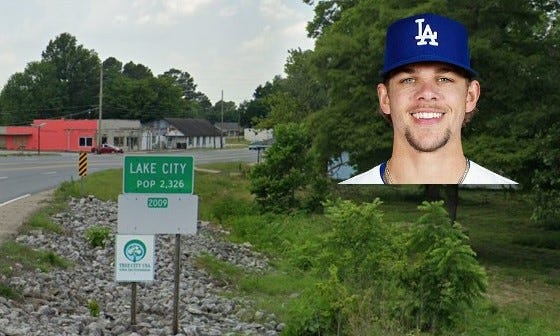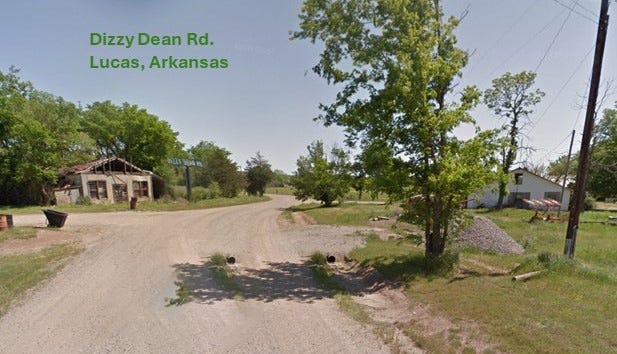Backroads and Ballplayers #61
Stories of the famous and not-so-famous men and women from the days when baseball was "Arkansas' Game." Always free and always short enough to finish in one cup of coffee.
Gavin Stone’s Improbable Journey and Our Grandpa’s Game
Over the past three months, I have written frequently about a young man from Lake City, Arkansas, and UCA, who has become one of the outstanding rookies in major league baseball. This week’s entire post is dedicated to Gavin Stone’s amazing journey from a small town in Craighead County, Arkansas, to pitch before 50,000 fans on a team with Mookie Betts, Freddie Freeman, and Shohei Ohtani.
While the road from rural Arkansas to the major leagues has become an unconventional route to a big-league dream, that was not always the case. The path from the backroads of a rural state to the major leagues was once the most common way to big league stardom.
When Baseball Was Arkansas’ Game
Before World War II and the gradual migration from farm life to cities and towns, baseball was our “grandpa’s game.” They played on Sunday in a pasture or a vacant lot. They listened on their battery-powered radios even before they had electricity and almost unanimously, they followed the St. Louis Cardinals. Baseball was Arkansas’ game when our ancestors needed it most. It was our grandparents’ escape from some hard times and an integral part of the lives of Arkansans who endured our state’s most difficult years.
Arkansas was basically a rural state for much of the early 1900s and baseball was part of the summer routine. Three acres, a ball, and a bat were all it took to play, and every community had a town team. Arkansans from this era endured two world wars, a pandemic, a historic flood, and a Great Depression. Baseball was a much-needed diversion, and they loved the game.
They attended their big-league games on the radio. Although they had never been to Sportsmans Park in St. Louis, they knew what it looked like, it was green and symmetrical like the cow pasture where they played on Sunday.
Our ancestors had never seen Dizzy and Paul in person, although most knew someone who had. They knew Diz was tall and lanky, with a shock of unruly dark hair. His uniform didn’t fit quite right, and he had a quick country grin. A lot of young men in their community looked like that.
They sat on green benches on courthouse lawns in places like Craighead, County, and talked about Stan Musial. In their playing days, they had tried to emulate his stance. He batted left-handed, hunched in an awkward slough, with his bat pointed straight up. They had seen it on the radio.
Some claimed to have met Lon Warneke, or George Kell, and almost everyone in Northeast Arkansas had a Preacher Roe story. The common dominator for most of the Arkansas-born baseball stars from our grandpa’s time was that they grew up in places like Lake City, Arkansas.
When Grant Koch was called up to the Pirates last week, he made the 165th Arkansas-born player in the National or American League since 1900. Just over 70% of those Arkansans were born before World War II. All the Hall of Famers from Arkansas are among those men.
Hall of Famers
Arkansas’ first-born Hall of Famer was Travis Jackson from Waldo, population 704. He graduated in a class of 12 and his father sold wholesale groceries from a horse and wagon.
Jerome Hanna Dean was born in Lucas, Arkansas. He moved from Logan County to Chickalah in Yell County around 1915. Both communities have country roads named for their major leaguer. Diz won 30 games in 1934, and he and his brother Paul won all four games of the 1934 World Series. Diz entered the Baseball Hall of Fame in 1953.
George Kell’s hometown of Swifton, in Jackson County, had a population of 484 when he left to play his first pro season at Newport in the Northeast Arkansas League. Kell won the batting title in 1949 and was inducted into the Baseball Hall of Fame in 1983.
Joseph Floyd Vaughan was born in Clifty (Madison County), an unincorporated community about 20 miles north of Huntsville. “Arky” Vaughan was named to the All-Star team in nine consecutive seasons. He was selected for the Hall of Fame by the Veterans Committee in 1985. Vaughan has the highest career batting average among Arkansans.
Louis Clark Brock was born in El Dorado in 1939. His mother moved the family to Collinston, Louisiana, population 482 when Lou was two. Brock was inducted into the Hall of Fame with Arky Vaughan in 1985.
Hall of Famer Brooks Robinson was born in Little Rock in 1937. His father and grandmother had moved to the city in the late 1920s because of the hardships the Robinson family faced on a farm in Pope County. His father Brooks Calbert Robinson Sr. grew up in Wilson, a farming community in the Atkins Bottoms that was devastated by the Flood of 1927.
Others
Lon Warneke from Owley in Montgomery County, has the most career pitching wins among Arkansas-born pitchers (192). In 1951, a country boy named Elwin Roe won 22 games and lost only three for the Brooklyn Dodgers. Roe grew up in Wild Cherry in Fulton County and attended Viola High School. Johnny Sain of Havana in Yell County pitched 28 complete games in 1948. He led the National League with 24 pitching wins and was named the 1948 National League Pitcher of the Year by the Sporting News.
Gavin Stone’s Improbable Journey
Since 2000, 28 Arkansans have made their major league debut. Among this group of aspiring big leaguers, five are from Little Rock, four are from Fayetteville, and all the others except one are from cities in Arkansas with a population of more than 5,000. That exception is Gavin Stone from Lake City, Arkansas.
There is a prophetic photograph of Gavin Stone in his high school yearbook wearing his Riverside High School baseball uniform. The caption reads, “You are your only limit.” For Gavin Stone of Lake City, Arkansas, that unlimited aspiration may have placed him in a major league baseball uniform, pitching in a big-league stadium before 50,000 fans. That childhood dream is now a reality.
Please join me in sharing this amazing story. Continue reading and share the story of Arkansas Gavins stone.







